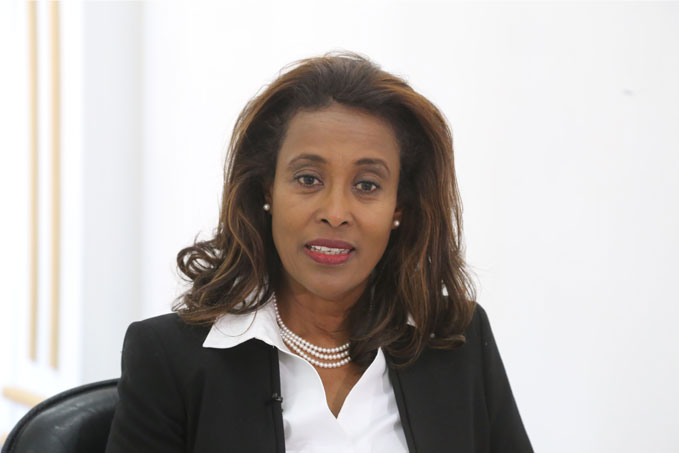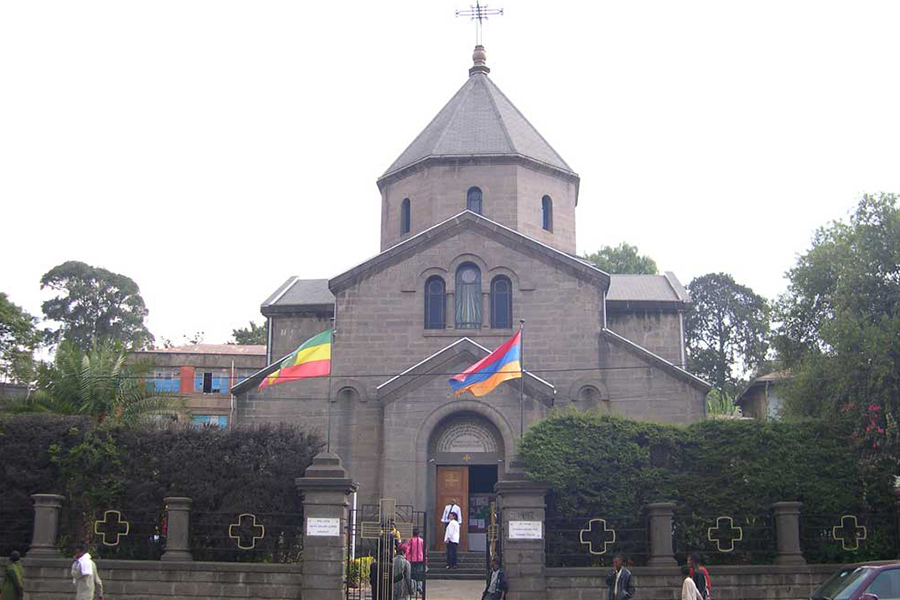
Feb 8 , 2020.
Belatedly, negotiators over the Great Ethiopian Renaissance Dam (DERD) took the rare gesture in explaining to the public the positions they have taken during tough talks with their counterparts from Sudan and Egypt. They faced a select group of people gathered at the Hyatt Regency Hotel late last week, in a forum organised by the Institute for Strategic Studies (ISA), after their return from Washington, D.C., the capital of the convener and the headquarters of the World Bank.
To their disappointment, the damage has already been done. Public perception has already been formed, seeing the negotiators in disfavour, believing that they have compromised Ethiopia's national interest under duress from the US government and the World Bank. The Hyatt session was an attempt to redress this and assure the public that no document will be signed if it is deemed against Ethiopia's interests. Indeed, the team, led by Seleshi Bekele (PhD), minister of Water, Irrigation & Energy, has delved into plenty of technical details to make its point and appealed for public understanding.
Such a highly charged session took place ahead of the two most decisive landmarks concerning the project. Ethiopia will begin filling the Dam in June 2020, and a series of agreements will need to be signed between the three countries governing the filling and operations of GERD.
It may not be fair to blame the negotiators for giving in to Washington's pressure considering how far Sudan, and in particular Egypt, has moved from their historically stubborn positions. That no project of any size and purpose could be undertaken, lest it would affect Egypt's historical right of utilising no less than 55.5 billion metric metres (bcm) of water annually. Back in the days, its leaders used to threaten to strike militarily against such projects in the upper riparian states.
Considering the lack of good faith from the "historical Egypt," reaching the current level should be seen as a monumental accomplishment. The talks are no longer about the right of upper stream countries, such as Ethiopia, taking advantage of their natural endowments. Thus, GERD and other dams in the drawing table are facts of life.
GERD alone is designed to generate 15,600Kwh of electric power, adding 150pc to existing capacity.
It should be expected if both Sudan and Eygpt feel insecure by GERD if only they did not squander the opportunity Ethiopia had offered for each of them to contribute 20pc in equity. Ethiopia’s ambitions to build a dam over the Blue Nile has been disconcerting news both to Sudan and Egypt. They depend heavily on the Nile, especially the latter, which has almost no other water resources for its 100 million population.
It also uses the Nile to generate power, and the Aswan Low Dam was constructed and completed by the British in 1902, while the Aswan High Dam was built and filled between 1960 and 1976. It was started with much fanfare, as is the case with the GERD, and today regulates flooding, provides irrigation and produces power.
Alas! Negotiators from all sides are now banging their heads against the wall through many sleepless nights playing with what may appear semantic for an average person. Ethiopia wants to see "equitable and reasonable utilisations" of the water resource flowing on the Nile River, while Egypt, in particular, insists it wants to prevent any use by upper stream countries "causing harm" to the livelihood of its citizens.
In relation to the GERD, a Declaration of Principles between the three countries was signed with a concession on the part of Egypt that the matter could be addressed only between them and not through mediators.
Many point fingers now at Ethiopia's negotiators for changing gears in upholding an "adaptive and cooperative" negotiating strategy in welcoming the "mediation" role of the US and the World Bank, as opposed to the firm position Ethiopia's leaders had held for eight years in avoiding the invitations. Indeed, it has been Egypt that was adamant about seeing the involvement of these parties in the tripartite talk among the three countries.
The involvement of parties with historical bias against any project on the Nile could put Ethiopia in the weakest position and its negotiators under enormous pressure to give in, all of which was evident in Washington. The parties that were tagged as having observer roles during the negotiations ended up being co-authors of a joint statement issued after the talks.
The statement refers to a broader understanding reached over the filling, storage and discharging of waters from the GERD during "drought, prolonged drought and extended drought" years. Although Ethiopia hopes to begin generating power after the Dam is filled with waters reaching above five billion cubic metres, its commitment to discharge waters during droughts of different magnitudes remain s a thorny issue.
Egypt wants Ethiopia to agree to discharge various volumes of water during times of drought, technically defined as a year when the water flow is at 31bcm. Historical data for the past 100 years shows that the Nile water flow had dropped significantly twice to 21bcm and 29bcm in 1913 and 1984, respectively.
As controversial as these commitments may be - because a country cannot guarantee it tames nature - the biggest mistake will be to sign a deal that will have implications on the broader and pending treaty on the water utilisation rights of the Nile River.
Eight of the riparian countries, including Ethiopia, were not a party to the 1959 agreement between Sudan and Egypt in sharing the Nile waters. Addressing this historical injustice has always been at the heart of the issue that led to the Cooperative Framework Agreement signed under the auspices of the Nile Basin Initiative, promoting a more equitable share of the water resources.
The Agreement was rejected by Sudan and Egypt, which claimed to have historical rights over the river, but it was still a positive step forward for the region in addressing the challenge of equitable use of water resources throughout the basin.
The current technical discussions taking place under the auspices of the United States and World Bank are jarring precisely for the reasons that the narrative has shifted, and the scope for deals has dramatically narrowed. There is no debate over how filling and operation of the GERD can affect the equitable use of water resources along the Nile Basin or the entirely faulty foundation on which Egypt's arguments are based.
Seleshi and his team have yet to convince the public on why Ethiopia had the sudden change of heart to agree to take the matter to such bodies when it had regional partnerships, such as the Initiative, and working principles, such as the 2015 Declaration, to work with.
Team Ethiopia could have asserted that negotiations should entirely be carried out between the three countries and not include outside parties. This would particularly be important, given that Egypt can punch much harder than Ethiopia can when it comes to exerting international influence. The negotiating team should also be able to make the argument that drought mitigation efforts should not entirely be left to Ethiopia. Egypt should also be able to lift its dependence on the Nile through increased investments in desalination projects.
No doubt the geopolitical situation, Ethiopia's weaker negotiating hand compared to that of Egypt's, and the national interests of countries such as the United States pushed Ethiopia to compromise. As Seleshi conceded, it is no laughing matter when the busiest men in the world, such as the US Treasury Secretary and the President at the helm of the World Bank, spent days brokering deals. Ethiopia's current leaders may have been compelled to give in, considering broader factors of economic support and security imperatives, or possible threats to lose them.
Indeed, history will give the better part of the verdict, judging the negotiators whether or not they have displayed character and conducted themselves with courage in defending the rights of over 100 million people.
PUBLISHED ON
Feb 08,2020 [ VOL
20 , NO
1032]

Commentaries | Aug 29,2020

Viewpoints | May 02,2024

Fortune News | Mar 30,2019

Sunday with Eden | Jul 03,2021

Radar | Jul 17,2022

Viewpoints | Jul 18,2020

Viewpoints | Sep 06,2020

View From Arada | Apr 26,2025

Viewpoints | Mar 07,2020

Viewpoints | Jun 27,2020

My Opinion | 131451 Views | Aug 14,2021

My Opinion | 127803 Views | Aug 21,2021

My Opinion | 125783 Views | Sep 10,2021

My Opinion | 123419 Views | Aug 07,2021

Dec 22 , 2024 . By TIZITA SHEWAFERAW
Charged with transforming colossal state-owned enterprises into modern and competitiv...

Aug 18 , 2024 . By AKSAH ITALO
Although predictable Yonas Zerihun's job in the ride-hailing service is not immune to...

Jul 28 , 2024 . By TIZITA SHEWAFERAW
Unhabitual, perhaps too many, Samuel Gebreyohannes, 38, used to occasionally enjoy a couple of beers at breakfast. However, he recently swit...

Jul 13 , 2024 . By AKSAH ITALO
Investors who rely on tractors, trucks, and field vehicles for commuting, transporting commodities, and f...

Jun 29 , 2025
Addis Abeba's first rains have coincided with a sweeping rise in private school tuition, prompting the city's education...

Jun 29 , 2025 . By BEZAWIT HULUAGER
Central Bank Governor Mamo Mihretu claimed a bold reconfiguration of monetary policy...

Jun 29 , 2025 . By BEZAWIT HULUAGER
The federal government is betting on a sweeping overhaul of the driver licensing regi...

Jun 29 , 2025 . By NAHOM AYELE
Gadaa Bank has listed 1.2 million shares on the Ethiopian Securities Exchange (ESX),...